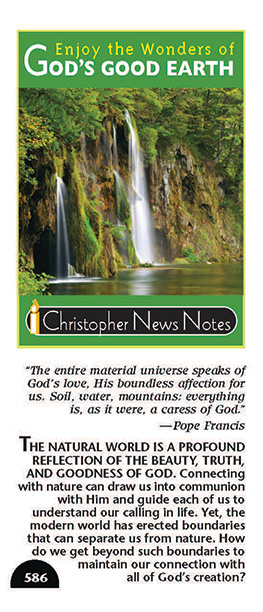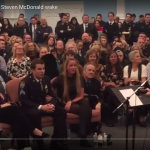 (The following is the text of the Christopher News Note “Enjoy the Wonders of God’s Good Earth,” which was written by a freelancer. If you’d like a pdf or hard copy, see the end of this post.)
(The following is the text of the Christopher News Note “Enjoy the Wonders of God’s Good Earth,” which was written by a freelancer. If you’d like a pdf or hard copy, see the end of this post.)
“The entire material universe speaks of God’s love, His boundless affection for us. Soil, water, mountains: everything is, as it were, a caress of God.” — Pope Francis
The natural world is a profound reflection of the beauty, truth, and goodness of God. Connecting with nature can draw us into communion with Him and guide each of us to understand our calling in life. Yet, the modern world has erected boundaries that can separate us from nature. How do we get beyond such boundaries to maintain our connection with all of God’s creation?
Bonding with People and Nature
“The best remedy for those who are afraid, lonely or unhappy is to go outside, somewhere where they can be quiet, alone with the heavens, nature and God. Because only then does one feel that all is as it should be and that God wishes to see people happy, amidst the simple beauty of nature.” — Anne Frank
In his book “Last Child in the Woods,” American journalist Richard Louv coined the phrase “nature deficit disorder” to describe the increasing disconnect between children and the natural world. He spent 10 years traveling the country, speaking with parents and their children, and gathering evidence to support his claim that exposure to nature is intrinsically linked to well-being in childhood.
Louv’s next book, “The Nature Principle,” extended his axiom to the well-being of adults. For example, he tells the story of Juan Martinez, who grew up poor and angry in south central Los Angeles. At the age of 15, a teacher gave Martinez the choice of either failing in class or joining the Eco Club.
Martinez chose the teacher’s second option— somewhat reluctantly at first, but he gradually warmed to the idea. He decided to grow a plant as a way to honor his mother, who grew medicinal plants in her small garden at home. That simple activity opened him up to a whole new way of thinking and looking at life.
Describing a trip he took with the Eco Club to Wyoming’s Grand Teton National Park, Martinez said, “I saw bison. I saw more stars than I could count. I was where there was no concrete, no gunshots, no helicopters over my head.”
After that trip, he constantly felt called to return to the wilderness. He became an outdoor leader and joined every program that would transport him out of the city. But, upon returning home, he would always feel depressed. His mentors recognized the problem, and, he said, “They sat me down and talked to me. Then they took me to community gardens and local green spaces, places not so far away, places that I could get to on a bus.”
Martinez continued to lead wilderness expeditions and described one particular adventure where he brought 20 kids from Watts to the Eastern Sierra region of California. He said, “The rst day of the 14-day trip was a rough one, with threats of violence, crying, fighting.” But midway through the trek, they settled into a more natural routine: “Our nightly res were filled with laughter. All they wanted was to be listened to, to be heard, to be recognized. They talked about the songbird that had captivated them that day or why people got hooked on drugs back home.”
A profound realization struck Martinez on that trip. He said, “I love nature because I love people…. It was never just about me! It was always about the love I have for my family, for my culture, for my community.”
He returned committed to improving his neighborhood rather than trying to run from it: “I would do all I could to share with my community the joy of nature, even by building a place in the middle of the ‘hood for songbirds, by sharing the crops of our small garden at home and teaching others how to do their own raised-bed gardens.”
Louv concluded, “Our relationship with nature is not only about preserving land and water, but about preserving and growing the bonds between us.”
Finding God in Nature
“We need to find God and He cannot be found in noise and restlessness. God is the friend of silence. See how nature—trees, flowers, grass—grows in silence; see the stars, the moon and the sun, how they move in silence…We need silence to be able to touch souls.” — Mother Teresa
In his encyclical “Laudato Si,” Pope Francis says of his namesake, St. Francis of Assisi, that he is “the example par excellence of care for the vulnerable and of an integral ecology lived out joyfully and authentically.”
Born into a wealthy merchant family in 12th-century Italy, St. Francis pursued a life of pleasure, materialism, and worldly honor as a young man. He also showed signs of a compassionate heart at a young age, abandoning the goods he was selling for his father in the marketplace to follow after a beggar and give him all the money he had.
Later, after returning from war, St. Francis was riding his horse in the countryside when he came upon a leper, at which point he halted his horse, dismounted, approached, and embraced the man. It was the greatest freedom Francis had ever experienced, and thereafter, he devoted himself to serving the poor and the outcast in fraternity with his brothers amid the beauty of the natural world.
The beloved saint spent much of his time praying outdoors, walking in the wilderness, hiking up mountains, sleeping in caves, and living in hermitages. He grew so close to nature that he came to realize a kinship with all living things. In his Canticle of the Creatures, he refers to elements of creation, such as the sun and the moon, as his brothers and sisters.
The pope says, “[St. Francis] shows us just how inseparable the bond is between nature, justice for the poor, commitment to society, and interior peace…What is more, St. Francis, faithful to Scripture, invites us to see nature as a magnificent book in which God speaks to us and grants us a glimpse of His infinite goodness and beauty.”
Pope Francis concludes, “Everything is connected. Concern for the environment thus needs to be joined to a sincere love for our fellow human beings and an unwavering commitment to resolving the problems of society.”
A Call to Action
“We are losing our attitude of wonder, of contemplation, of listening to creation and thus we no longer manage to interpret within it what Benedict XVI calls ‘the rhythm of the love-story between God and man.’”
— Pope Francis
At the heart of “Laudato Si” is an urgent call for us to recover our sense of wonder for the natural world so that we might respect and preserve all of God’s creation. Noting that original sin has caused a rupture between humanity and nature, Pope Francis writes, “It is significant that the harmony which St. Francis of Assisi experienced with all creatures was seen as a healing of that rupture. St. Bonaventure held that, through universal reconciliation with every creature, St. Francis in some way returned to the state of original innocence.”
It is this state of innocence that Pope Francis calls us to recover in our relation to nature. He calls us to educate ourselves about care for the environment and follow current best practices when it comes to recycling, reducing consumption, and conserving natural resources. He calls us to overcome boundaries imposed by the technological age and seek out interactions with others in the natural world (rather than simply in cyberspace) in order to fully recognize their dignity as human beings. And he calls us to integrate our care for the environment with a consistent ethic of life, paying special attention to the poor, the elderly, the unborn, and all of the vulnerable whom God entrusts to our care.
While Pope Francis is critical of the damage modern man has inflicted upon God’s creation, he has hope in the future, writing, “Yet all is not lost. Human beings, while capable of the worst, are also capable of rising above themselves, choosing again what is good, and making a new start, despite their mental and social conditioning. We are able to take an honest look at ourselves, to acknowledge our deep dissatisfaction, and to embark on new paths to authentic freedom. No system can completely suppress our openness to what is good, true and beautiful, or our God-given ability to respond to His grace at work deep in our hearts. I appeal to everyone throughout the world not to forget this dignity which is ours. No one has the right to take it from us.”
“I love to think of nature as an unlimited broadcasting station, through which God speaks to us every hour, if we will only tune in.”
– George Washington Carver
Ways to Connect with Nature
Explore – Get outside on a regular basis and pay attention to the natural world. Taking trips to parks and wilderness areas can ignite our passion for God’s creation, but we should remember that nature is everywhere and it enhances our lives to tend a small garden, go for a walk on a tree-lined street, or even grow a plant indoors.
Commune – Allowing the beauty of the natural world to touch our souls can open our hearts to the divine presence in all things and enrich our prayer lives.
Bond – Nature awakens our senses and, therefore, can heighten the joy we experience while socializing in the natural world and deepen our connection with those we love.
Respect – Care for the environment is an important sign of respect for God and ensures that the gift of the natural world will be preserved for many generations to come.
Act – We should join with people of good will in conservation efforts and call on politicians to uphold a consistent ethic of life in public policy decisions, insisting that they prioritize a respect for the sanctity of human life while also safeguarding our natural resources as precious gifts from God.
To receive a pdf or mailed copy of “Enjoy the Wonders of God’s Good Earth” – or to subscribe to Christopher News Notes via email or snail mail – send your request to [email protected]
Stay in touch! Like The Christophers on Facebook:












